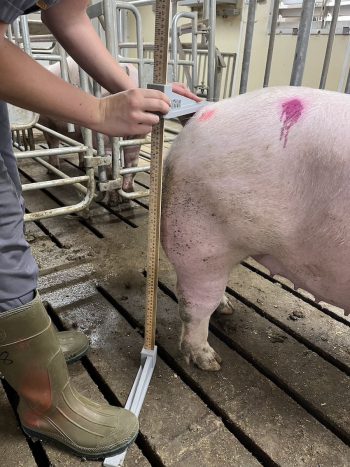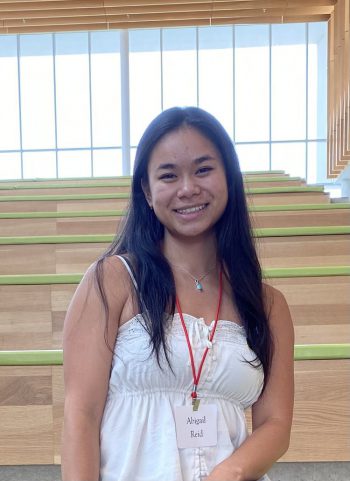Abigail Reid from Cornell University and Savannah Thomson from MSU were selected as the 2024 FSF scholarship recipients.
Merck Animal Health has awarded fellowships totaling $10,000 to two veterinary students who participated in the Michigan State University College of Veterinary Medicine’s Food Systems Fellowship Program (FSF).
2024 is the 19th year of FSF. The program, originally exclusive to MSU, is now open to veterinary students nationwide.
FSF offers unique, hands-on learning experiences in food supply veterinary medicine through summer internships with MSU faculty or industry partners. Since 2006, Merck Animal Health has been a key FSF partner for the College and, in 2013, began awarding scholarships to support students and help address the national shortage of food animal veterinarians. This year, Abigail Reid from Cornell University and Savannah Thomson from MSU were selected as the 2024 FSF scholarship recipients.
“FSF students are exceptionally bright and engaged,” says Dr. Angel Abuelo, assistant professor of cattle health and wellbeing for the MSU Department of Large Animal Clinical Sciences and FSF program lead . “It is always rewarding to see the projects unfold, and it’s always a challenge to select scholarship recipients.”

Savannah Thomson, a second-year MSU DVM student from Alpena, Michigan, focused on the health of sows in her project. She aimed to find a way to collect measurements that might predict — and prevent — pelvic organ prolapse, a common cause of death for sows. Drawing on methods used with cattle and sheep, she planned to collect measurements of health and strength from 700 commercial sows. This, Thomson knew, was an ambitious goal for a 10-week program.
Thomson called on former classmates — the Alpena High remote operated vehicle (ROV) team — to help develop a practical, low-cost tool that would make it possible to take the measurements quickly. The team designed modified calipers and produced a carbon-fiber prototype using a 3D printer. The innovation, called the Pig-o-Meter, made it possible for Thomson to complete her project. In the months since its development, the technology yielded a 2024 Morrison Swine Innovator Prize for Thomson and is under review for a patent through MSU.
“One of my career goals is to improve production animal welfare,” says Thomson. “FSF gave me critical industry experience and a great opportunity to directly address a sow health issue.”

Abigail Reid, third-year student at Cornell College of Veterinary Medicine, is a member of the Herd Health and Repro team at Cornell and works as a student milker and skid steer operator at Cornell’s Teaching Dairy. She’s been involved with sample collection for various studies at Cornell, ranging from post-partum hypocalcemia and neonatal calf health. Reid also had the opportunity to work on a Holstein rearing farm in Spain, where she assisted veterinarians in daily assessments and treatment of calves on-farm. From Pawling, New York, she earned her bachelor’s degree, with a major in anthrozoology, from Cornell University College of Arts & Sciences.
“FSF provided me with additional research training in immunological and epidemiological techniques,” says Reid. “I hope to become a clinician-scientist within the cattle industry and help advance technologies in bovine medicine — the skills I learned this summer will be essential as I move forward in my career.”
After graduation, she plans to spend time in clinical practice, and then hopes to return to academia for a PhD in bovine medicine and technology. Her goal is to contribute to on-farm technological advances in health monitoring and diagnostics for calves.
“Merck Animal Health’s generous support – as well as their research, products, and services – makes a real impact on future and current veterinarians who will take care of production animals,” says Abuelo.
